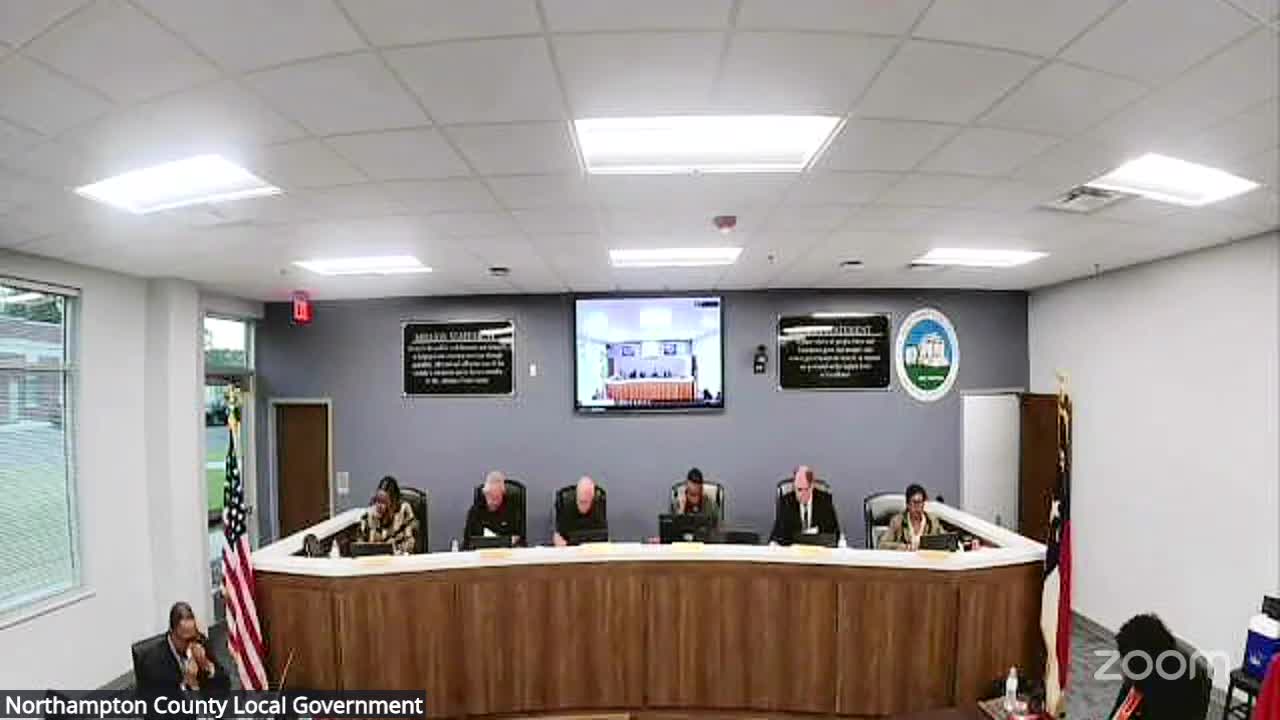County staff outline solid-waste fee components and steps to reduce uncollected balances
October 13, 2025 | Northampton County, North Carolina
This article was created by AI summarizing key points discussed. AI makes mistakes, so for full details and context, please refer to the video of the full meeting. Please report any errors so we can fix them. Report an error »

The Northampton County public works and finance staff presented the composition of the county’s solid-waste curbside fee and explained why the fee rose in Fiscal Year 2024 and how recent contract renegotiation could reduce costs going forward.
Staff said the curbside fee accounts for about 77% of the solid-waste fund’s revenue and noted that the annual fee shown on the property tax bill includes the curbside vendor cost plus overhead and uncollected-fee allowances. The presenter reviewed a five-year history showing the curbside component of the fee rose in fiscal 2024 because of higher vendor (GFL) pricing and uncollected balances; the county recorded a deficit and required a transfer from the general fund in prior years to cover shortfalls.
The presentation explained that the county’s property-tax-based billing system can allocate a citizen’s payment across multiple tax/fee lines in a way that makes direct collection of curbside fees difficult. Staff recommended evaluating a separate billing system for solid waste to allow payments to be applied directly to solid-waste accounts and to improve collection, and that any change would require an ordinance amendment because the board previously authorized inclusion of the fee on property tax bills.
Staff also presented contract history with GFL (curbside vendor) and noted a renegotiated rate that went into effect July 1 that materially reduces the direct curbside cost per customer in the FY26 budget. Because of outstanding uncollected balances and prior-year deficits, staff said county officials will reconcile actual fund results over several months before recommending fee reductions to ensure the fund remains solvent.
Why it matters: The solid-waste fund is largely sustained by a mandatory annual fee added to property tax bills; residents and commissioners asked why the fee increased. The presentation aimed to make the calculation transparent and identify administrative and collection steps that could reduce the need for general-fund transfers.
Ending
Staff said they will present detailed solid-waste fund reconciliations during the budget season and consider a complete study and potential ordinance amendment to change billing method; any changes to fees would be based on multi-month financial data and the board’s subsequent deliberations.
Staff said the curbside fee accounts for about 77% of the solid-waste fund’s revenue and noted that the annual fee shown on the property tax bill includes the curbside vendor cost plus overhead and uncollected-fee allowances. The presenter reviewed a five-year history showing the curbside component of the fee rose in fiscal 2024 because of higher vendor (GFL) pricing and uncollected balances; the county recorded a deficit and required a transfer from the general fund in prior years to cover shortfalls.
The presentation explained that the county’s property-tax-based billing system can allocate a citizen’s payment across multiple tax/fee lines in a way that makes direct collection of curbside fees difficult. Staff recommended evaluating a separate billing system for solid waste to allow payments to be applied directly to solid-waste accounts and to improve collection, and that any change would require an ordinance amendment because the board previously authorized inclusion of the fee on property tax bills.
Staff also presented contract history with GFL (curbside vendor) and noted a renegotiated rate that went into effect July 1 that materially reduces the direct curbside cost per customer in the FY26 budget. Because of outstanding uncollected balances and prior-year deficits, staff said county officials will reconcile actual fund results over several months before recommending fee reductions to ensure the fund remains solvent.
Why it matters: The solid-waste fund is largely sustained by a mandatory annual fee added to property tax bills; residents and commissioners asked why the fee increased. The presentation aimed to make the calculation transparent and identify administrative and collection steps that could reduce the need for general-fund transfers.
Ending
Staff said they will present detailed solid-waste fund reconciliations during the budget season and consider a complete study and potential ordinance amendment to change billing method; any changes to fees would be based on multi-month financial data and the board’s subsequent deliberations.
View full meeting
This article is based on a recent meeting—watch the full video and explore the complete transcript for deeper insights into the discussion.
View full meeting
